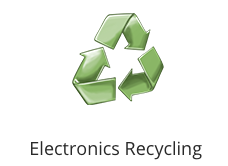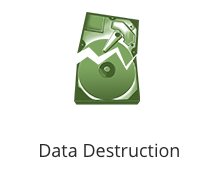 The LITS Electronic Waste program is a success story in which Emory is able to sustainably dispose of electronic waste in ways that are good for the environment while also reducing overall cost to the university.
The LITS Electronic Waste program is a success story in which Emory is able to sustainably dispose of electronic waste in ways that are good for the environment while also reducing overall cost to the university.
Where we were
In 2017, Emory was processing electronic waste for the campus in a very basic way. A vendor would come to predefined locations on campus, pick up our excess electronic waste and dispose of it. Not only was this process bad for the environment, but it cost Emory $64,000 a year. Our suspicion was that at least a portion of this electronic waste had some value. So the fact that we were paying this much for the disposal of it was difficult to digest. We knew we had an opportunity to make improvements. Additionally, what we found was that working through this kind of basic vendor afforded us very little visibility into what they were doing with the waste.
An internal audit revealed we had insufficient controls over the process in terms of environmental and security concerns. Environmentally, we suspected, but could not verify, that the majority of this waste was going to landfills. Regarding data security, we felt that our data destruction protocols were inconsistent and that Emory data was at risk through this process. In some cases, data was not being destroyed before it went out the door and an assumption was being made that our vendor was handling that destruction, which they were not. Add these concerns to the high cost of the service and it was clear that changes needed to be made.
Late in 2017, we entered into a 90-day pilot program with Premier Surplus, located in Dawsonville, GA. They are certified in recycling electronic waste. We also discovered working through Premier that they did not have any restrictions in terms of pickup location. So with this new program, we could simply give them an address on campus or in metro Atlanta and they have trucks that can stop in at a specific address that we provide, thus making the materials logistically easier to handle. Premier also performs data destruction in a verifiable way, using the National Institute of Standards and Technology (NIST) standards to consistently destroy data, which is a tremendous benefit for Emory.
Another benefit of Premier Surplus was the availability of full metrics and usage data. In FY19, we learned that Emory produced 64 tons of electronic waste, far more than we anticipated, and was able to resell or recycle almost all of it. This recycling generated $31,840 in revenue for Emory. Only 0.4% of the waste had to go to a landfill.

 The difference in what we were paying our old vendor versus now receiving credits is a major victory for this program. In fact, leftover funds from the recycling program have been applied to other programs relating to device security through the implementation of systems that allow us to keep many third-party on applications on our Windows machines up to date with security patches and updates.
The difference in what we were paying our old vendor versus now receiving credits is a major victory for this program. In fact, leftover funds from the recycling program have been applied to other programs relating to device security through the implementation of systems that allow us to keep many third-party on applications on our Windows machines up to date with security patches and updates.
Thanks to key players
I’d like to thank Jason Cook (Supervisor, Desktop Support) who has been managing this process, and Brad Sanford, (Chief Information Security Officer) whose security team played a big part in examining the data security-related aspects as well as identifying the impact to customers. Additionally, this program’s success relies heavily on our partnerships with all of LITS Client Services, Emory’s EHSO team, Campus Services, and all local IT departments around campus.
If you want more information about the program, feel free to reach out to Jason at jason [dot] cook [at] emory [dot] edu.

